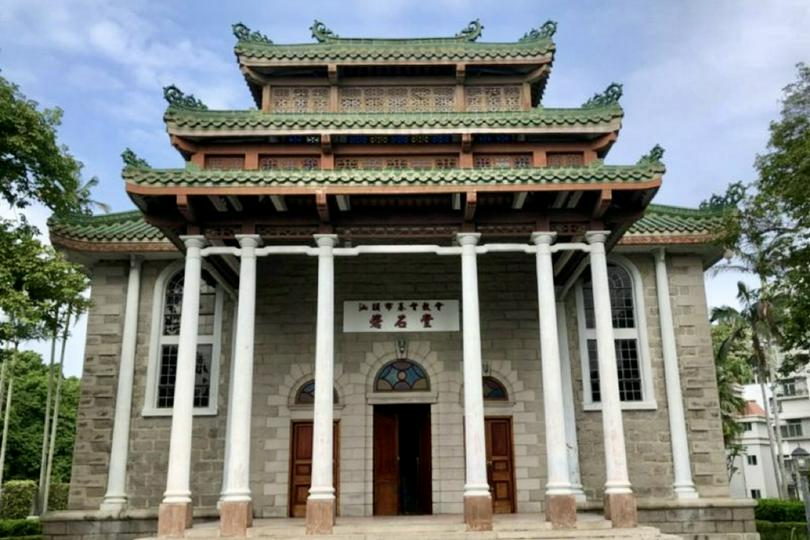On May 3, the 2025 Logos International Forum, an initiative of the Centre for Sino-Christian Studies within the Faculty of Arts and Social Sciences, convened at Hong Kong Baptist University (HKBU), seeking to encourage Christians to cultivate a holistic worldview rooted in their faith, to move beyond the conceptual separation of the sacred and profane, and to integrate their faith into every facet of life.
The forum's agenda included discussions across four primary themes: "Faith and Chinese Culture," "Faith and Mental Health," "Faith and the Workplace," and "Faith and Science." The afternoon session dedicated to "Faith and Chinese Culture" featured a dialogue titled "Death and Eternal Life", presented by Professor Wang Zhongjiang from the School of Philosophy at Renmin University of China and Professor Zeng Qingbao from the Department of Philosophy at Fu Jen Catholic University. (View the morning session here)
The afternoon session dedicated to "Faith and Chinese Culture" featured a dialogue titled "Death and Eternal Life", presented by Professor Wang Zhongjiang from the School of Philosophy at Renmin University of China and Professor Zeng Qingbao from the Department of Philosophy at Fu Jen Catholic University.
Professor Wang initiated the discussion by tracing the historical pursuit of immortality within the Chinese context. He painted a vivid picture of imperial quests for elixirs of life, citing figures like Qin Shi Huang and Emperor Wu of Han, and explored the rich Daoist alchemical traditions. The Daoist belief in achieving immortality rested on four theoretical pillars: the idea that all things are possible, that everything is in constant change, the principle of complementarity, and the unique agency of human beings. A key figure highlighted was Ge Hong, whose defiant declaration, "My fate is in my hands, not in Heaven's," encapsulated a profound belief in human agency to alter natural processes and achieve extraordinary longevity, even a form of "unity with the Dao" through the cultivation of vital energy (Qi).
Professor Wang then navigated the nuanced views of Laozi and Zhuangzi. He explained Laozi's distinction between the eternal, timeless Dao and the finite existence of individual things, suggesting that Laozi's concept of "death without perishing" pointed towards a spiritual or influential immortality rather than mere physical continuation. Zhuangzi's philosophy, with its ideal figures of the "True Man" (Zhenren) and "Spirit Man" (Shenren) who "roam freely with the spirit of Heaven and Earth," further emphasized a spiritual transcendence over physical decay.
Shifting to Confucianism, Professor Wang underscored its pragmatic focus on the present life, encapsulated in the famous query, "Not knowing life, how can one know death?" Death, in this view, was often seen as a "great rest." The Confucian pursuit of immortality, Professor Wang elaborated, was primarily achieved through the "Three Immortalites": establishing virtue, performing meritorious deeds, and leaving behind wise words. He also touched upon Hu Shi's modern interpretation of social immortality, where an individual's impact continues through their contribution to society. He concluded his overview of Chinese thought by briefly mentioning Buddhism's unique perspective, rooted in "dependent origination" and the concept of "no-self" (anātman), which offers a path to liberation (Nirvana) by transcending the cycle of rebirth (samsara) and the fear of personal annihilation.
Professor Zeng approached the theme from a Christian theological standpoint: he observed that human civilization, through its grand structures, emphasis on procreation, literary endeavors, and religious systems, has consistently sought to confront and overcome mortality.
Central to Professor Zeng's exposition of the Christian understanding of a "God who dies," he explained that the crucifixion of Jesus Christ stands as a core, yet profoundly "counter-intuitive," tenet of the faith, challenging conventional notions of divine impassibility and invulnerability. This "death of God," Professor Zeng argued, is not an end but a pivotal turning point, a prerequisite for resurrection and new life. The Christian concept of "eternal life," he clarified, is less about a detailed post-mortem itinerary and more about the quality of life lived in the present, in anticipation of a future hope.
Drawing on existentialist thought, Professor Zeng referenced Heidegger's "being-towards-death," affirming that an awareness of mortality is intrinsic to human existence. He characterized Christianity as fundamentally "life-affirming," where discussions of death ultimately serve to illuminate the meaning and value of life. The resurrection of Christ, therefore, is not merely a historical event but signifies a new mode of being, a triumph over death that opens up new possibilities and a future orientation, resonating with concepts like Jürgen Moltmann's "Theology of Hope." Professor Zeng also provocatively linked this to Marxist thought, suggesting that Marx's vision of a "German Resurrection Day" symbolized an ultimate liberation from all forms of oppression, with death being the final oppressor to be overcome, as true freedom necessitates conquering this ultimate constraint.
In the ensuing Q&A session, both professors elaborated on their positions. Professor Wang reiterated his stance on the finality of physical death from a naturalistic perspective, while emphasizing that Chinese naturalism is deeply imbued with ethical and aesthetic values, allowing for meaning even within a cyclical view of existence. He expressed skepticism towards purely materialistic or reductionist explanations of consciousness and the universe's origins, favoring a more holistic understanding, potentially through concepts like "Qi."
Professor Zeng, in his responses, acknowledged the inherent unanswerability of some ultimate questions but stressed the human necessity of confronting them. He re-emphasized the "counter-intuitive" nature of Christian claims like the death of God, presenting them not as absurdities but as profound challenges to conventional human reason, inviting a leap of faith. He framed death not as a definitive end but as a potential new beginning, a transition that, when viewed through the lens of resurrection, could be approached with hope rather than despair, ultimately signifying a victory over the fear that death traditionally instills.
As the lecture concluded, the responses from both professors not only clarified key points but also expanded the discussion's depth and breadth, leaving attendees with food for thought about humanity's enduring quest to understand mortality and meaning.












